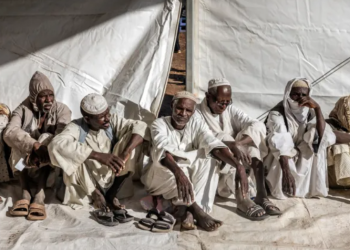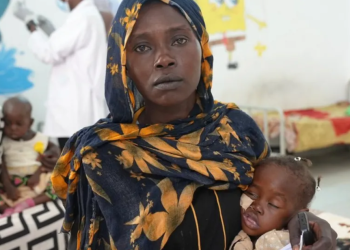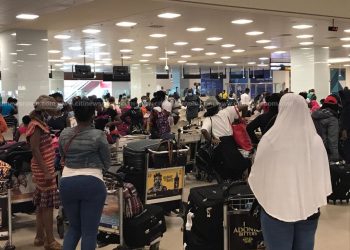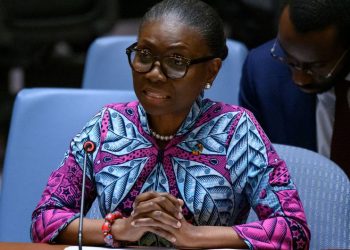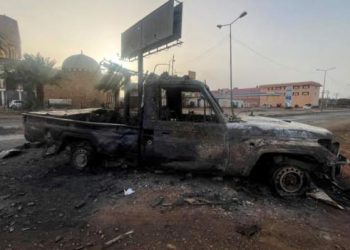The history of the world is replete with a litany of crises that mankind has suffered and battled with for survival. These include but are not limited to the Trojan War, Marathon War, the Crimean War, the First and Second World Wars, the Congo crisis, the Liberian civil war, and lately the Russo -Ukraine conflict.
In all these situations mankind was in either despair to suffer the horrors that accompanied those crises or trying to charter a new path of progress. However, man is himself complicit and cannot absolve himself from the causes of the crises and therefore must bear the brunt of consequences thereafter.
The African continent is notable for several crises that are natural or human-induced. When confronted by such crises the leaders of the continent seldom act to ameliorate the situation and mostly rely on external powers to provide the solutions for African problems.
Several years ago, the African Union formally the Organization of African Unity was formed to tackle the problems of Africa. Sixty years down the lane, Africa is still in the dilemma either divided among itself or lethargic in acting to solve the many wars or conflicts that bedevilled the continent.
Humanity is facing several challenges at this moment, and Sudan is a country that provides a particularly interesting perspective on some of these challenges. Sudan has witnessed several crises that have almost plunged the country into the abyss. The country has been struggling with many political, economic, and social issues in recent years, which have left the country at a crossroads.
Since independence in 1956, Sudan has had more than fifteen military coups and has also been ruled by the military for the majority of the republic’s existence, with only brief periods of democratic civilian parliamentary rule.
The current transitional government is facing significant challenges in trying to establish stability and democracy. In 2011, the country was divided into two: the republic of Sudan and South Sudan to satisfy the South who felt neglected in the share of the national cake though heavily endowed with resources. It was then believed that the split would cripple and nip in the bud the division which fuel the conflict in Sudan but this has proven futile in the face of the current crisis.
The history of conflicts in Sudan has consisted of foreign invasions and resistance, ethnic tensions, religious disputes, and competition over resources.
The Sudan crisis that occurred in April and took many by surprise is further deteriorating causing a humanitarian crisis and prompting urgent attention to address it. An armed conflict between rival factions of the military government of Sudan began on 15 April 2023. It started when clashes broke out in western Sudan, in the capital city of Khartoum, and in the Darfur region.
In August 2019, after international pressure and mediation by the African Union and Ethiopia, the military agreed to share power in an interim joint civilian-military unity government (the Transitional Sovereignty Council), headed by a civilian Prime Minister, Abdalla Hamdok, with elections to take place in 2023. However, in October 2021, the military seized power in a coup led by Sudanese Armed Forces (SAF) leader General Abdel Fattah al-Burhan and Rapid Support Forces (RSF) leader General Mohamed Hamdan Dagalo. The Transitional Sovereignty Council was reconstituted as a military junta led by General Al-Burhan, monopolizing power and halting Sudan’s brief transition to democracy.
The fighting began with attacks by the paramilitary Rapid Support Forces (RSF) on key government sites. Airstrikes, artillery, and gunfire were reported across Sudan including in Khartoum. As of 23 April 2023, both the RSF leader General Mohamed Hamdan Dagalo, and Sudan’s de facto leader and army chief General Abdel Fattah al-Burhan claimed control of several key government sites, including the general military headquarters, the Presidential Palace, Khartoum International Airport, Burhan’s official residence, and the Sudan National Broadcasting Corporation (SNBC) headquarters.
The conflict between the two generals has led Sudan to the brink of renewed civil war, and it has been referred to as a “burgeoning civil war”.
Tensions between the RSF and the Sudanese junta, however, began to escalate in February 2023, as the RSF began to recruit members from across Sudan. A brief military build-up in Khartoum was succeeded by an agreement for de-escalation, with the RSF withdrawing its forces from the Khartoum area. The junta later agreed to hand over authority to a civilian-led government, but it was delayed due to renewed tensions between generals Burhan and Dagalo, who serve as chairman and deputy chairman of the Transitional Sovereignty Council, respectively.
Chief among their political disputes is the integration of the RSF into the military: the RSF insisted on a ten-year timetable for its integration into the regular army, while the army demanded integration within two years.
Consequently, the two civil wars between the central government and the southern regions killed 1.5 million people, and a continuing conflict displaced two million people and killed more than 200,000 people. Inflation has been a persistent problem in Sudan, with rates reaching as high as 438% in 2020, according to the World Bank.
The country’s inflation rate has been driven by a combination of factors, including the devaluation of the Sudanese pound, increasing food prices, and higher transportation costs due to fuel subsidies being reduced. The conflict has also led to widespread famine, with millions of people facing severe food shortages and malnutrition. Nearly 30,000 Sudanese refugees are reported to have crossed the border into South Sudan.
For most of its 10 years of existence, South Sudan has been in a civil war and more than a third of the population has been forcibly displaced—2.2 million as Internally Displaced Persons and 2.3 million as refugees. About 7.8 million are facing acute food insecurity including 43,000 facing famine—virtually all of which is attributed to conflict (Africa Center for strategic studies, 2023).
This reality underscores the compounding effects that each of the region’s crises are having on one another. Sudan had already been hosting over 1 million refugees from its neighbors, as well as 3.7 million of its own internally displaced (out of a population of 45 million). Almost 30 percent of the refugees in Sudan were living in Khartoum and are now trying to evade the fighting there.
The United Nations said on 2 May that the fighting in Sudan had produced around 334,000 internally displaced persons, while more than 100,000 have fled to Egypt, Chad, South Sudan, Ethiopia, and Central African Republic (CAR)—countries that are facing their own stressors (Africa center for strategic studies, 2023). These figures are surely an undercount as humanitarian access and communications with much of the country have been cut. UNHCR warns that 800,000 people could flee Sudan because of the conflict.
The World Health Organization recorded around 26 attacks on healthcare facilities, some of which resulted in casualties among medical workers and civilians. The Sudanese Doctors’ Union said more than two-thirds of hospitals in conflict areas were out of service with 32 forcibly evacuated by soldiers or caught in the crossfire.
The United Nations reported that shortages of basic goods, such as food, water, medicines, and fuel have become “extremely acute” (UN, 2023). The delivery of badly-needed remittances from overseas migrant workers was also halted after Western Union announced it was closing all operations in Sudan until further notice.
The World Food Programme said that more than $13 million worth of food aid destined for Sudan had been looted since the fighting broke out (WHO, 2023). In addition to displacement and famine, the conflict in Sudan has also resulted in other humanitarian crises, including widespread violence against civilians, sexual violence, and the recruitment of child soldiers.
These acts in Sudan and by extension Africa put the continent in a precarious position and if not properly addressed are likely to be exploited by extremists to destabilize the continent
International organizations such as the United Nations (UN) and the African Union (AU) have also played a role in Sudan’s ongoing conflict. The UN has deployed peacekeeping forces in Sudan to help maintain peace and security, the mission has been criticized for its inability to end the conflict. Although the AU has also been involved in peace negotiations and has facilitated talks between the various parties involved in the conflict, these are not enough to deal with the situation.
It is, also, worth stating that while the war in Ukraine received international media attention and the world powers acted promptly, the same cannot be said about the Sudan crisis. The international community was also swift in condemning the war in Ukraine perpetrated by Russia.
However, the silence is similar to the case in the Rwandan genocide. In 1994, in the heat of the Rwandan genocide where about 800000 Tutsis and Hutus moderates were killed in the first hundred days, the African Union, formally the Organization of African Unity and the United Nations sat aloof even though Boutros Boutros Ghali, an African was the UN Secretary-General.
If these events are to go by, the questions that must be asked are: whether the African Union is capable of serving Africa, and does African life matter at all? whether this is the Africa that our forefathers dreamt of and fought so hard for her independence? Can be true that when Africa is mentioned then such words as poverty, high illiteracy, high mortality, poor development, political instability, and civil unrest are associated with her? One should ask for how long will Africa continue to wail and wander among her peers with no rest for lack of peace and prosperity?
Then the words of the former President of South Africa, Botha, are still alive and well when he said that the black man is a symbol of poverty, mental inferiority, laziness, and emotional incompetence and that if you give Africans a gun, they will kill themselves. This somehow has made some scholars conclude that the AU is a fraudulent trojan horse or a toothless bold dog that can only bark but cannot bite. Fifty-five countries in Africa yet continue to beg for support and aid from external donors.
The remark of President William Ruto of Kenya is worth referencing when he said that the fifty-five countries in Africa have failed when they cannot provide seven million euros to Sudan and only looked unconcern for the European Union to commit seven million euros to support Sudan in the face of her crisis. We can’t continue to be regarded as second-rated beings.
Africa must rise to the occasion and deal with the African problems. Let me use the words of Langenhoven, who said, if we are in front, we can wait for time but if we are behind, it does not wait for us. The vast resources such as gold, diamond, bauxite, rubber Cocoa just to mention a few combined with technology can solve many of Africa’s underdevelopment if we eschew the greed, corruption, selfishness, and tribalism, eliminate the winner takes all mentality and put the good of Africa above personal objective.
Africa must also define for herself what she wants and moving forward what she will do to achieve that and stop the political and moral squint to the West. Africa must learn to eat and patronize what it produces. No wonder Ali Mazrui said Africa produces what it does not consume and consumes what it does not produce.
The continent of Africa must exorcise the ghost of fear and negativity and embrace the painful yet soothing medicine of science and technology to develop Africa. Africa, rise for the glory of a man walks hand in hand with his doom and you cannot get anything under the bed without bending.
In effect, the crisis in Sudan requires more than just the government of Sudan to tackle the situation but the collective efforts of Africa and the international community to prevent further catastrophes.
The African Union which has been sleeping must wake up to the challenges of Africa and find lasting solutions to the numerous coup d’états as well as the civil unrest the continent has witnessed since independence.
Africa must charter a new path if she is to survive and claim her position in international politics and be able to sit as a diner at the dinner table among her peers and not a beggar to eat crumbs. Africa will develop by Africans, not by anybody outside no matter how convincing the West may appear to be championing the development of Africa. They normally act in stealth to torpedo the very efforts of Africa to meet her needs and demands.


